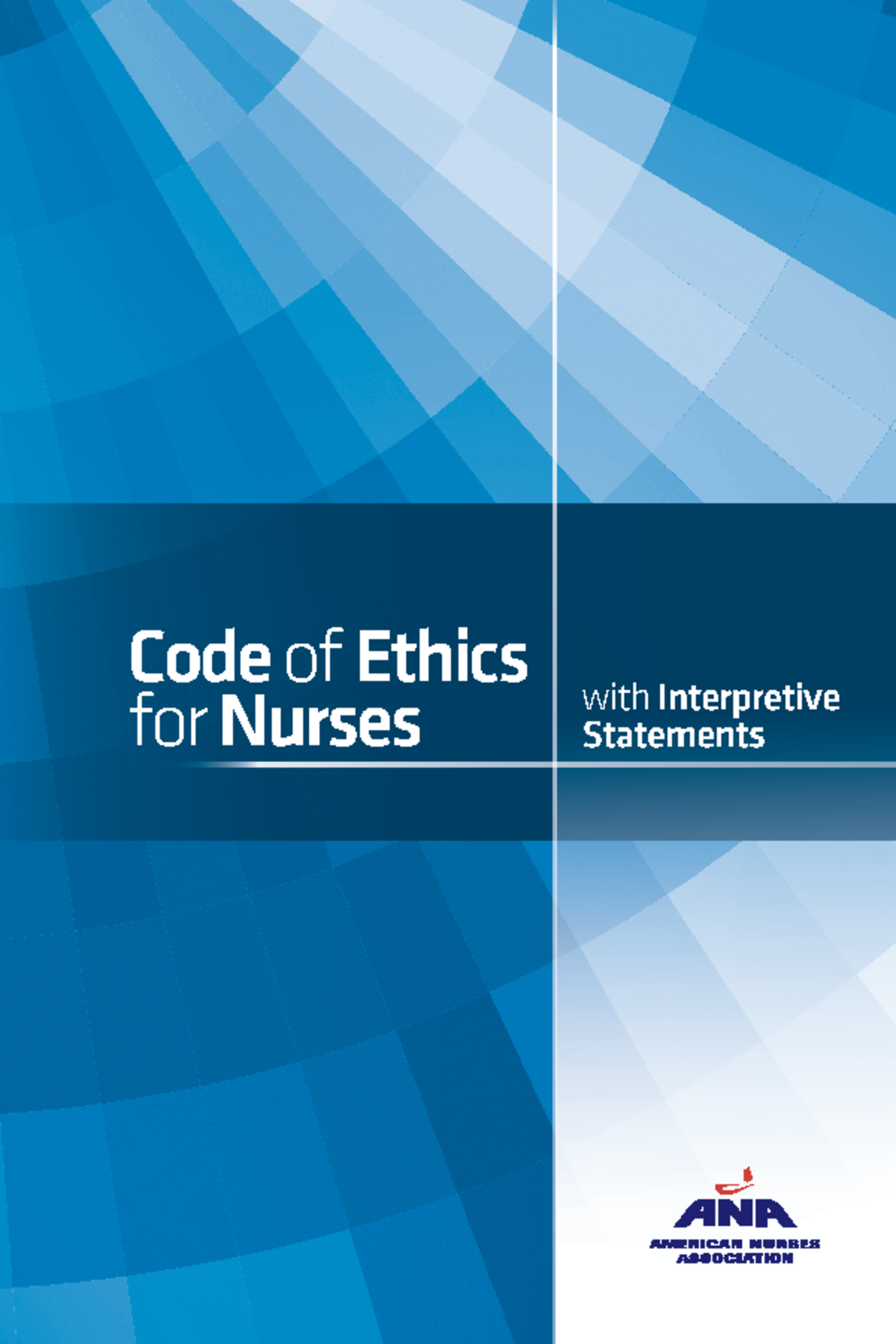Imagine a young nurse, fresh out of school, walking into their first shift on a busy medical-surgical unit. The sights, sounds, and smells are overwhelming. The patients, each with their own unique story and needs, demand her attention. Fear and uncertainty cloud her mind: “What if I make a mistake? How do I prioritize so many needs? How can I be the best advocate for these patients?” In these moments, a crucial guide emerges – the American Nurses Association (ANA) Code of Ethics.

Image: senabooks.com
The ANA Code of Ethics, available online as a free PDF download, isn’t just a set of rules; it’s a beacon of ethical principles that light the way for nurses in all situations. It’s a compass that guides their moral compass and defines the very essence of nursing practice. This code establishes the non-negotiable standards for professional nursing conduct, outlining the core values that shape the profession’s integrity. This concise yet powerful document serves as the bedrock of ethical decision-making, ensuring nurses consistently prioritize their patients’ well-being and uphold the sanctity of human life.
The ANA Code of Ethics: A History of Compassion and Advocacy
The ANA Code of Ethics has a rich history, reflecting the evolving landscape of nursing. It’s a living document, constantly shaped and refined by the changing needs of patients and the broader healthcare environment. Since the first version was published in 1950, the Code has undergone numerous revisions, echoing shifts in societal values and medical advancements.
The current version, issued in 2015, represents the culmination of decades of deliberation and input from countless nurses across the nation. It’s a testament to the enduring values of the nursing profession, emphasizing ethical principles such as:
- Beneficence: Acting in the best interest of the patient. This principle serves as the cornerstone of nursing care, driving nurses to prioritize their patients’ well-being above all else.
- Non-maleficence: Doing no harm to patients. This principle guides nurses to carefully weigh the potential benefits and risks of any action they take, always striving to minimize harm to their patients.
- Autonomy: Respecting the patient’s right to self-determination. This principle recognizes the patient’s right to make decisions about their own health care, even if those decisions differ from what the nurse believes is best.
- Justice: Fair and equitable treatment for all patients. This principle stresses the importance of treating all patients with respect and dignity, regardless of their race, ethnicity, gender, sexual orientation, socioeconomic status, or any other factor.
- Veracity: Truthfulness and honesty in all interactions. This principle underlines the vital role of transparent communication between nurses and patients. It emphasizes the importance of being forthright, even when delivering difficult news, to foster trust and empower informed decision-making.
The Code’s Impact: Navigating Ethical Dilemmas in Nursing
The ANA Code of Ethics isn’t just a theoretical document; it’s a practical guide for navigating the complex ethical dilemmas nurses frequently encounter. Its principles help nurses make sound decisions when confronted with difficult situations, ensuring their actions align with their fundamental ethical obligations.
Examples of how nurses use the code in practice include:
- Patient confidentiality: The Code emphasizes the importance of protecting patient privacy. Nurses are obligated to maintain confidentiality, even when faced with challenging circumstances, such as a patient’s request to withhold information from their family or a colleague’s breach of confidentiality.
- End-of-life care: The Code provides guidance on how nurses should approach end-of-life care, ensuring patients receive compassionate and dignified care, regardless of their prognosis. It emphasizes the importance of respecting patient autonomy, even when a patient’s wishes differ from those recommended by medical professionals.
- Advocacy for patients: The Code stresses the importance of advocating for patients’ needs and rights. This includes addressing concerns about patient care, advocating for access to healthcare, and ensuring patients are empowered to make informed decisions about their well-being.
- Truthfulness and honesty: The Code underlines the importance of honesty and transparency in patient care. It underscores the importance of informing patients about their illness, treatment options, and potential risks, even when those conversations are challenging.
Resources and Insights for Nurses and Healthcare Professionals
The ANA website provides a wealth of resources for nurses seeking guidance on the Code of Ethics. This includes a PDF download of the full text, as well as articles, webinars, and other materials that explore specific ethical dilemmas and provide practical advice for navigating them.
For those seeking further guidance, the ANA offers continuing education courses, workshops, and conferences that delve into the Code of Ethics. These opportunities allow nurses to stay abreast of evolving ethical considerations in healthcare and enhance their skills in ethical decision-making, leadership, and advocacy.

Image: www.studocu.com
Ana Nursing Code Of Ethics Pdf
Conclusion: Embracing the Guiding Light
The ANA Code of Ethics isn’t a static document; it’s a dynamic guide that evolves with the changing landscape of nursing. It serves as a beacon of ethical principles, empowering nurses to make compassionate, ethical decisions that uphold the profession’s core values and prioritize the well-being of their patients. By embracing the principles outlined in the ANA Code of Ethics, nurses can honor their commitment to providing safe, effective, and ethical care.
Whether you are a seasoned professional or a student just beginning your nursing journey, the ANA Code of Ethics is an invaluable tool for navigating the complex ethical landscape of nursing. Download the free PDF today and discover the powerful guidance within its pages. Embrace its principles, and you’ll be on your way to becoming a truly ethical and compassionate nurse.






